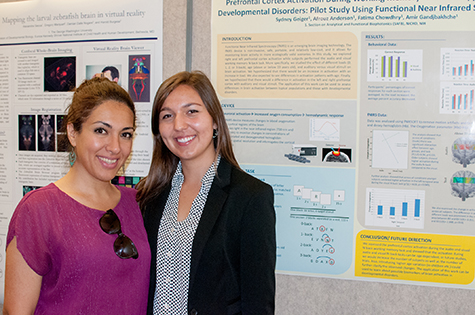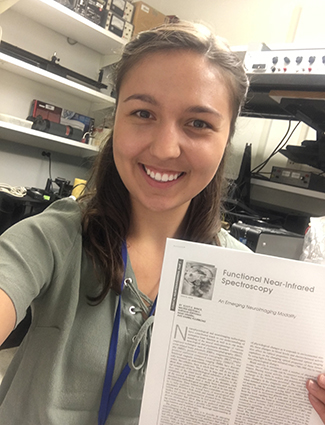St. Olaf
St. Olaf student conducts research at National Institutes of Health
Posted by McNair Scholars Program on Saturday, October 8, 2016 2:22 - 0 Comments

Sydney Geiger ’18 (right) and National Institutes of Health biomedical engineer Afrouz Anderson stand in front of a poster describing the research they worked on together using emerging brain imaging technology.
St. Olaf College student Sydney Geiger ’18 spent her summer at the National Institutes of Health (NIH), where she conducted research that involved emerging brain imaging technology as part of the Amgen Scholars Program.
The new technology that Geiger adopted in her research is called Functional Near-Infrared Spectroscopy. This device measures changes in blood oxygenation in cortical regions of the brain, which can then be used as biomarkers for brain activation. Geiger explains that “the technology is appealing because it is non-invasive and portable, allowing brain activity to be monitored in real-life settings.”
After Geiger had familiarized herself with the device, she was able to pose her own research question to her mentor, biomedical engineer Afrouz Anderson. The two of them explored right and left prefrontal cortex activation in subjects performing a working memory task. “We found some exciting results,” Geiger says, and Anderson is continuing to pursue this project.
“She is keeping me updated on the research and has asked me to help write some parts of the paper that we are hoping to have published,” says Geiger.
The summer that she spent at NIH was deeply influential for Geiger, who is majoring in biology at St. Olaf.
“It was incredible for my development as a scientist and as a student,” says Geiger, a TRIO McNair Scholar who also participates in the Northstar STEM Alliance at St. Olaf. “I was able to take part in the research process from beginning to end and gain an understanding of how an experiment goes from the conception of the research question to the drafting of a final paper.”

Sydney Geiger ’18 in her National Institutes of Health lab with some of the research available on Functional Near-Infrared Spectroscopy.
Since Geiger is trying to determine whether she would rather become a medical doctor or a physician-scientist, the glimpses that she gained into these two careers through the Amgen Scholars Program were instrumental. Beyond the research that she conducted, Geiger job shadowed and completed several informational interviews while at NIH.
The Amgen Scholars Program also appealed to Geiger because of its special focus on health disparities. Through weekly lectures from top scientists, roundtable discussions, and even the creation of their own policy briefs, the program encourages participants to consider barriers to achieving optimal health that socially disadvantaged populations experience.
Geiger left NIH not only more accomplished scientifically but also more informed socially.
“One of my priorities as a doctor or a physician-scientist will be to remain conscious of health disparities and work to combat them,” she says. “The Amgen Scholars Program allowed me to connect my passion for positive change with my passion for medicine and science.”
Amgen Scholars is an international program funded by the Amgen Foundation. The program partners with 17 leading educational and research institutions in the United States, Europe, and Japan to host undergraduate students in research labs. Participants are able to conduct research under world-renown faculty mentors as well as attend symposiums, seminars, and networking events.